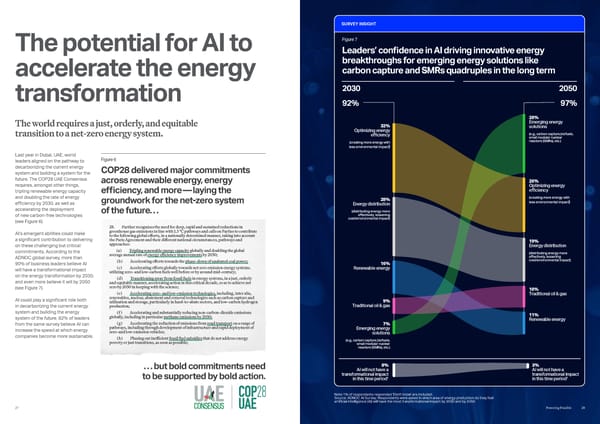SURVEY INSIGHT The potential for AI to accelerate the energy transformation Last year in Dubai, UAE, world leaders aligned on the pathway to decarbonizing the current energy system and building a system for the future. The COP28 UAE Consensus requires, amongst other things, tripling renewable energy capacity and doubling the rate of energy efficiency by 2030, as well as accelerating the deployment of new carbon-free technologies (see Figure 6). AI’s emergent abilities could make a significant contribution to delivering on these challenging but critical commitments. According to the ADNOC global survey, more than 90% of business leaders believe AI will have a transformational impact on the energy transformation by 2030, and even more believe it will by 2050 (see Figure 7). AI could play a significant role both in decarbonizing the current energy system and building the energy system of the future. 82% of leaders from the same survey believe AI can increase the speed at which energy companies become more sustainable. Figure 7 Leaders’ confidence in AI driving innovative energy breakthroughs for emerging energy solutions like carbon capture and SMRs quadruples in the long term Figure 6 COP28 delivered major commitments across renewable energy, energy efficiency, and more — laying the groundwork for the net-zero system of the future… The world requires a just, orderly, and equitable transition to a net-zero energy system. Note:1% of respondents responded 'Don't know' are included; Source: ADNOC AI Survey; Respondents were asked in which area of energy production do they feel artificial intelligence (AI) will have the most transformational impact by 2030 and by 2050. … but bold commitments need to be supported by bold action. 92% 2050 2030 28. Further recognizes the need for deep, rapid and sustained reductions in greenhouse gas emissions in line with 1.5 °C pathways and calls on Parties to contribute to the following global efforts, in a nationally determined manner, taking into account the Paris Agreement and their different national circumstances, pathways and approaches: (a) Tripling renewable energy capacity globally and doubling the global average annual rate of energy efficiency improvements by 2030; (b) Accelerating efforts towards the phase-down of unabated coal power; (c) Accelerating efforts globally towards net zero emission energy systems. utilizing zero- and low-carbon fuels well before or by around mid-century; (d) Transitioning away from fossil fuels in energy systems, in a just, orderly and equitable manner, accelerating action in this critical decade, so as to achieve net zero by 2050 in keeping with the science; (e) Accelerating zero- and low-emission technologies, including, inter alia, renewables, nuclear, abatement and removal technologies such as carbon capture and utilization and storage, particularly in hard-to-abate sectors, and low-carbon hydrogen production; (f) Accelerating and substantially reducing non-carbon-dioxide emissions globally, including in particular methane emissions by 2030; (g) Accelerating the reduction of emissions from road transport on a range of pathways, including through development of infrastructure and rapid deployment of zero-and low-emission vehicles; (h) Phasing out inefficient fossil fuel subsidies that do not address energy poverty or just transitions, as soon as possible; 10% Traditional oil & gas 11% Renewable energy 28% Emerging energy solutions (e.g., carbon capture,biofuels, small modular nuclear reactors (SMRs), etc.) 8% AI will not have a transformational impact in this time period1 9% Traditional oil & gas 16% Renewable energy 28% Energy distribution (distributing energy more effectively, lessening cost/environmental impact) 32% Optimizing energy efficiency (creating more energy with less environmental impact) 19% Energy distribution (distributing energy more effectively, lessening cost/environmental impact) 26% Optimizing energy efficiency (creating more energy with less environmental impact) 7% Emerging energy solutions (e.g., carbon capture,biofuels, small modular nuclear reactors (SMRs), etc.) 3% AI will not have a transformational impact in this time period1 97% 92% 28 Powering Possible 27
 Powering Possible 2024: AI and Energy for a Sustainable Future Page 14 Page 16
Powering Possible 2024: AI and Energy for a Sustainable Future Page 14 Page 16